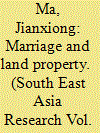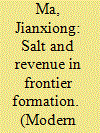|
|
|
Sort Order |
|
|
|
Items / Page
|
|
|
|
|
|
|
| Srl | Item |
| 1 |
ID:
111469


|
|
|
|
|
| Publication |
2011.
|
| Summary/Abstract |
This paper discusses how a social system based on bilateral and non-hierarchical kinship is able to establish and maintain systems of authority. The Muga Lahu in Yunnan practise a bilateral and non-lineal kinship system based on the gender equality principle, and communal life is also based on equal couples' kinship networking, bound to non-lineal ties through marriage. The Lahu here never practise matrilineal, patrilineal or cognatic kinship and descent in daily life, but an individual couple is bound to immediate ancestors through the redistribution of cropland property. In communal life, family separation and farmland reorganization are carried out dynamically through the marriages of the younger generation. The flexible kinship group establishes labour-sharing, ritual-participating and intermarriage groups in everyday life. Therefore, the kinship system is closely bound to farmland redistribution and the continuation of families. This bilateral, non-lineal kinship system constitutes a dynamic social institution, but all couples are equal to each other. Due to the lack of authority over the equality of social units such as equal couples, the Lahu communal authority historically comes from superior external powers, such as the religious power linked with religious movements involved in the Yunnan-Burma frontier formation since the 1720s. The established Lahu political system was destroyed by the coming of the Qing and the Republic states, because of its anti-Han or anti-state stance in frontier history. It is clear that the superior religious power over the kinship network worked as a means of social mobilization through religious movements, and became the authority source for social cohesion in history, but it has been replaced by state-appointed cadres in current communal life in China. The Lahu case shows that more attention should be paid to the relationships between frontier history, dynamic kinship and social organization among ethnic minorities in Chinese and South East Asian frontier societies.
|
|
|
|
|
|
|
|
|
|
|
|
|
|
|
|
| 2 |
ID:
141086


|
|
|
|
|
| Summary/Abstract |
This research reviews the formation of the Yunnan-Burma frontier since the 1720s, when the Qing government reformed the administrative systems from chieftainships to official counties in the middle and southern Yunnan mountains areas. One of some crucial political changes was the policy of salt revenue which directly stimulated large scale ethnic resistance in the region of salt wells. However, the social political context of continuing ethnic conflicts was not only rooted in the reshaping of the salt-consuming districts, but also rooted in social changes in the Yunnan-Burma borderland because of increasing Han Chinese immigration and their penetration into mining, long distance trade and local agriculture. In order to successfully control mountain resources as the base of revenue, the Qing government continued to gradually integrate native Dai chieftains into official counties. Local resistance continued and reached a peak from the 1790s to the 1810s. Pushed by the Qing government, and with the collaboration of different social actors, the synthesized mobilization of frontier formation had made ethnic politics a main style of social political reconstruction, even if commercial exchange, long distance trade, and demographic reshaping also continued to be mixed with ethnic politics as another layer of the Yunnan-Burma frontier formation.
|
|
|
|
|
|
|
|
|
|
|
|
|
|
|
|
|
|
|
|
|